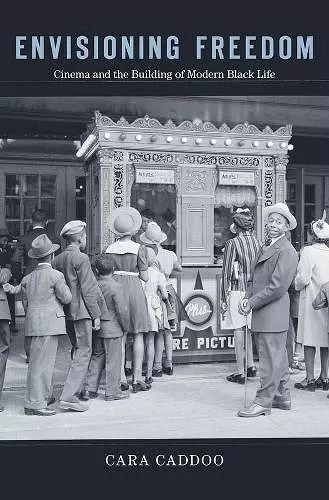Envisioning Freedom
Cinema and the Building of Modern Black Life
Format:Hardback
Publisher:Harvard University Press
Published:13th Oct '14
Currently unavailable, and unfortunately no date known when it will be back

Viewing turn-of-the-century African American history through the lens of cinema, Envisioning Freedom examines the forgotten history of early black film exhibition during the era of mass migration and Jim Crow. By embracing the new medium of moving pictures at the turn of the twentieth century, black Americans forged a collective—if fraught—culture of freedom.
In Cara Caddoo’s perspective-changing study, African Americans emerge as pioneers of cinema from the 1890s to the 1920s. Across the South and Midwest, moving pictures presented in churches, lodges, and schools raised money and created shared social experiences for black urban communities. As migrants moved northward, bound for Chicago and New York, cinema moved with them. Along these routes, ministers and reformers, preaching messages of racial uplift, used moving pictures as an enticement to attract followers.
But as it gained popularity, black cinema also became controversial. Facing a losing competition with movie houses, once-supportive ministers denounced the evils of the “colored theater.” Onscreen images sparked arguments over black identity and the meaning of freedom. In 1910, when boxing champion Jack Johnson became the world’s first black movie star, representation in film vaulted to the center of black concerns about racial progress. Black leaders demanded self-representation and an end to cinematic mischaracterizations which, they charged, violated the civil rights of African Americans. In 1915, these ideas both led to the creation of an industry that produced “race films” by and for black audiences and sparked the first mass black protest movement of the twentieth century.
According to Cara Caddoo’s lively, readable, richly detailed new history of African-American film cultures at the turn of the 20th century, the cinema was a central motor force for the formation of racial identity and community in the era of Jim Crow. Envisioning Freedom, which packs a tremendous amount of fascinating incident into a relatively short page count, introduces us to black church leaders in the Midwest who invested heavily in film technology as a tool for their ministries, embattled black theater owners in the segregated South, and the pioneers of African-American independent cinema at home and abroad. And Caddoo’s account of the mass protest movement that arose against D.W. Griffith’s racist epic The Birth of a Nation provides a moving case study in the age of Ferguson and the New Jim Crow. -- Phillip Maciak * Slate *
Excellent…A scholarly work, it’s both readable and revelatory. -- Thomas Gladysz * Huffington Post *
In this brilliant, pathbreaking work, Caddoo reveals how moving pictures transformed black modern sensibility and how rural migrants envisioned new meanings of freedom. Richly detailed and filled with stunningly original insights, this bold and ambitious book sets a new standard for studies of black migration, urban history, and cinema. -- Thavolia Glymph, author of Out of the House of Bondage
This is a big, bold book and an easy, seductive read. Caddoo, a talented historian, traces the lost plotlines of mass culture, political struggle, and public space in the age of Jim Crow, plotlines that have been buried for too long beneath more familiar legal dramas and movement histories. -- Matthew Pratt Guterl, author of Josephine Baker and the Rainbow Tribe
- Winner of Vincent P. DeSantis Prize 2015
- Nominated for Berkshire Conference of Women Historians First Book Prize 2014
- Nominated for Wesley-Logan Prize 2015
- Nominated for John Hope Franklin Publication Prize 2015
- Nominated for James A. Rawley Prize 2015
ISBN: 9780674368057
Dimensions: unknown
Weight: unknown
304 pages